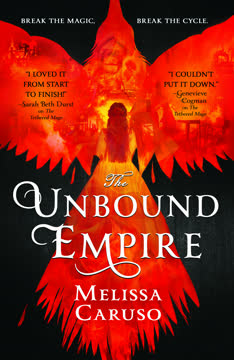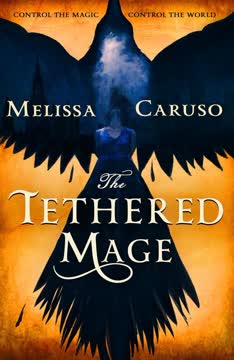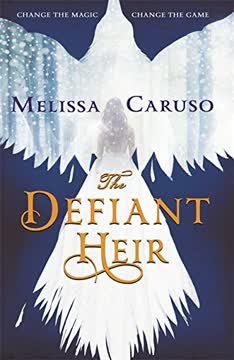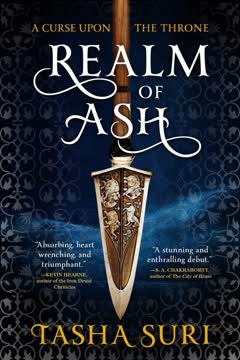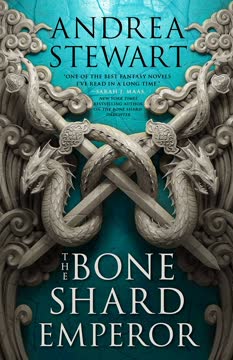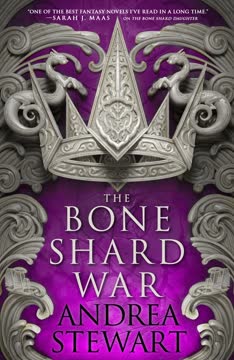Plot Summary
Prison Shadows and Warnings
Amalia Cornaro, heir to the powerful Cornaro family, visits her imprisoned cousin Ignazio, who hints at a looming threat from Ruven, the Skinwitch Witch Lord. Ignazio's cryptic message—"Don't trust familiar faces"—and his sudden death by a magical chimera underscore the Empire's vulnerability. Amalia's world is one of political intrigue, where trust is scarce and every alliance is fraught with danger. The encounter leaves her shaken, forced to confront the reality that the Empire's enemies are already within its walls, and that even family can be both a source of pain and a tool for manipulation. The shadow of Ruven's schemes begins to fall over Raverra, setting the stage for a battle not just of armies, but of secrets and loyalties.
Poison, Plots, and Loss
The aftermath of Ignazio's murder ripples through Amalia's life, exposing the Empire's fragility. She confides in Marcello, her steadfast friend and would-be lover, as they try to unravel Ruven's plans. The poison that killed Ignazio is a warning: Ruven's reach is long, and his methods insidious. Amalia's grief is complicated by the knowledge that her family's power is both shield and shackle. The political climate grows tense as Amalia's reform efforts for the mage-marked—those with dangerous magical gifts—face resistance from the Council. The personal and the political intertwine, as Amalia's relationships are tested by the ever-present threat of betrayal and the cost of doing what is right.
Tallows, Traps, and Deceptions
Amalia, Zaira, and Marcello investigate rumors of Ruven recruiting alchemists from the Tallows, Raverra's poorest district. Their search uncovers not Ruven's plot, but a deception orchestrated by Lord Caulin, a Council member seeking to manipulate public fear for political gain. The trio's journey through the Tallows reveals the precarious lives of the mage-marked and the ease with which power can be abused. Amalia's resolve to pass her Falcon reform law—ending forced conscription of mages—hardens, even as she realizes that the greatest threats to the Empire may come from within. The lines between friend and foe blur, and Amalia learns that survival depends on outwitting not just enemies, but supposed allies.
Masquerade of Betrayal
At Lady Aurica's masquerade, Amalia and her friends race to prevent a staged magical attack meant to discredit her reforms. The true culprit is Lord Caulin, who hired mage-marked Tallows crews to spike the party's food with sleep potion, intending to frame them and stoke fear. Amalia turns the tables, securing evidence of Caulin's duplicity and using it as leverage. The episode cements her reputation as a political force, but also marks her as a target. The masquerade's glittering surface conceals a city on the brink, where every gesture is a move in a deadly game. Amalia's victory is bittersweet, as she realizes that power is won not just by courage, but by mastering the art of blackmail and compromise.
Crows, Courtship, and Secrets
Amalia's alliance with Kathe, the Crow Lord of Let, deepens as they exchange intelligence and flirtation. Kathe warns of Ruven's impending invasion, and the two share a rare moment of vulnerability and connection. Their courtship is both political and personal, a dance of wit and longing. Amalia's heart is torn between Kathe's dangerous allure and Marcello's steadfast devotion. The looming threat of war forces her to confront the limits of trust and the price of love. In the midst of intrigue, Amalia finds solace in small joys—a mask shop, a stolen kiss—but knows that every happiness is shadowed by the choices she must make for the Empire.
Festival of Masks
The Night of Masks, Raverra's grand festival, becomes the backdrop for both celebration and peril. Amalia, Zaira, and Marcello move from party to party, searching for signs of Ruven's plot. Amidst the revelry, Amalia and Marcello share a dance that rekindles old feelings, even as duty keeps them apart. The festival's disguises mirror the deceptions at play in the city. When Ruven finally strikes, it is not with armies, but with poison and subterfuge, targeting the very heart of the Empire. The night's beauty is marred by violence, and Amalia is forced to confront the reality that no one—not even those she loves—is safe.
Ruven's Deadly Invitation
Ruven confronts Amalia at a masquerade, paralyzing her with his magic and threatening Marcello's life to force her compliance. The encounter is a masterclass in psychological warfare, as Ruven offers Amalia a devil's bargain: help him conquer Vaskandar, or watch her friends suffer. Marcello is brutally injured before Amalia's eyes, a message that Ruven's power is absolute and his cruelty boundless. The attack leaves Amalia shaken but resolute, her determination to stop Ruven hardening into steel. The cost of resistance is made clear, and the stakes are no longer just political—they are deeply, painfully personal.
Aftermath and Resolve
In the wake of Ruven's attack, Amalia grapples with guilt over Marcello's injuries and the knowledge that her enemies will target those she loves. Her mother, La Contessa, offers hard-won wisdom: power means teaching others the cost of hurting your friends. The Empire reels from the assault, and Amalia is forced to balance her personal anguish with the demands of leadership. The lesson is clear: to protect what she values, she must be willing to fight—and, if necessary, to destroy those who threaten her. The emotional toll is immense, but Amalia emerges with a new sense of purpose and a deeper understanding of what it means to wield power.
The Empire's Fractures
The Council of Nine is thrown into turmoil by Ruven's machinations and the exposure of Lord Caulin's treachery. Amalia's Falcon reform law comes to a vote, and she must navigate a labyrinth of political maneuvering, personal appeals, and moral compromise. The debate is fierce, with arguments for tradition clashing against calls for justice. Amalia's speech before the Assembly is a turning point, as she appeals to the Empire's better angels and the practical benefits of reform. The outcome is uncertain, and the fate of the mage-marked—and the Empire itself—hangs in the balance.
The Vote for Freedom
Amalia's Falcon Reserve Act passes, ending forced conscription of mage-marked children and granting them new freedoms. The victory is hard-won, achieved through compromise and the support of unlikely allies. The law's passage is celebrated, but also marks the beginning of new challenges, as the Empire must adapt to a changed balance of power. Amalia's triumph is tempered by the knowledge that every gain comes with a cost, and that the struggle for justice is never truly over. The moment is both an ending and a beginning, as the Empire steps into an uncertain future.
The Night the Mews Fell
Ruven's true plan unfolds as he seizes control of the Mews, the Empire's magical stronghold, by poisoning its inhabitants. Amalia, Zaira, and their friends fight desperately to retake the fortress, facing friends turned enemies and the threat of magical annihilation. The battle is brutal, forcing Amalia to confront the reality that sometimes survival means hurting those you care about. The Mews is eventually reclaimed, but not without loss and trauma. The episode is a stark reminder that the Empire's greatest strengths can become its greatest vulnerabilities, and that victory often comes at a terrible price.
Storm on the Lagoon
With the Mews compromised, Ruven compels Jerith, a storm warlock, to unleash a hurricane on Raverra. Amalia and her allies race against time to stop him, navigating a city on the brink of disaster. The confrontation is a test of trust and sacrifice, as friends must risk everything to save the city. The storm is a metaphor for the chaos engulfing the Empire, and its resolution comes at great personal cost. The episode cements Amalia's role as both savior and leader, but also leaves her haunted by the choices she has made and the lives lost along the way.
The Siege of Ardence
Ruven's army marches on Ardence, and Amalia, Zaira, and their allies must defend the city with limited resources. The siege is a crucible, forcing Amalia to balance strategy, compassion, and the harsh necessities of war. Zaira's balefire becomes the Empire's last hope, but its use threatens to consume her humanity. The battle is both physical and moral, as Amalia must decide how much she is willing to sacrifice to save her people. The cost is measured in lives and in the scars left on those who survive.
Fire and Ashes
Zaira unleashes her full power, incinerating thousands of Ruven's conscripts to save Ardence. The aftermath is a landscape of ash and bone, and the emotional toll on Zaira and Amalia is profound. The victory is pyrrhic, as the survivors must reckon with the horror of what they have done. The episode is a meditation on the limits of power and the dangers of becoming what one fights against. Amalia's leadership is tested as she must comfort her friends, justify her choices, and prepare for the final confrontation with Ruven.
The Witch Lord's Web
To defeat Ruven, Amalia and Kathe seek the aid of the Lady of Spiders, a Witch Lord who demands a terrible price: the secrets of one's soul. Zaira volunteers, enduring a harrowing ordeal that exposes her deepest fears and guilt. The encounter is a test of friendship and trust, as Amalia and Zaira confront the darkness within themselves. The Lady of Spiders' web is both literal and metaphorical, a reminder that every alliance comes with strings attached. The price of victory is not just blood, but the willingness to face one's own demons.
The Price of Secrets
As the final plan to trap Ruven takes shape, Amalia and her allies must decide who will risk everything to lure him into their trap. Hal, one of Kathe's Heartguard, volunteers, knowing it may cost him his life. The moment is a crucible of leadership, as Amalia learns that true power means asking others to make sacrifices she cannot make herself. The lines between friend and tool blur, and the cost of victory becomes deeply personal. The episode is a meditation on the burdens of command and the meaning of loyalty.
The Last Gambit
The trap is sprung, but Ruven outmaneuvers Amalia, killing Hal and breaking the circle of Truce Stones. Kathe is gravely wounded and entombed beneath a lake, forced to relive his worst nightmare. Zaira's balefire rages out of control, and Marcello, transformed into a chimera, is forced to act against his will. Amalia is pushed to her limits, forced to choose between saving her friends and saving the Empire. In a desperate gambit, she uses the jess to bind Ruven and, with Zaira's help, destroys him in a blaze of fire. The victory is hard-won, and the cost is measured in scars that will never fully heal.
Empire Unbound
With Ruven defeated, the Empire must rebuild. Amalia, Zaira, and Marcello return to Raverra, forever changed by what they have endured. The Falcon Reserve Act transforms the lives of the mage-marked, and new freedoms bring both hope and uncertainty. Amalia's leadership is recognized, and she takes her place on the Council of Nine, ready to guide the Empire into a new era. The story ends with a sense of hard-won peace, tempered by the knowledge that every victory is built on sacrifice, and that the work of building a just world is never truly finished.
Characters
Amalia Cornaro
Amalia is the heir to the powerful Cornaro family and, by the end, a member of the Council of Nine. Her journey is one of transformation—from a sheltered scholar to a political force and, ultimately, a leader willing to make impossible choices. Amalia's relationships are the heart of the story: her deep friendship and magical bond with Zaira, her complicated love for Marcello, and her dangerous courtship with Kathe. She is defined by her empathy, her intellect, and her willingness to bear the burdens of power. Amalia's greatest struggle is reconciling her ideals with the harsh realities of leadership, learning that every victory comes with a cost, and that true strength lies in the courage to face one's own flaws and to keep fighting for a better world.
Zaira
Zaira is a fire warlock whose power is both a weapon and a curse. Her relationship with Amalia is central—a partnership forged in trust, conflict, and mutual respect. Zaira's journey is one of self-acceptance, as she learns to control her balefire and to believe that she is more than the destruction she can unleash. Her romance with Terika offers her a glimpse of happiness and belonging, but she is haunted by guilt and the fear of becoming a monster. Zaira's humor and bluntness mask deep wounds, and her willingness to sacrifice herself for others is both her strength and her vulnerability. She embodies the story's exploration of power, trauma, and the possibility of redemption.
Marcello Verdi
Marcello is a captain of the Falconers, Amalia's closest confidant, and her would-be lover. His unwavering sense of honor and compassion make him a moral anchor, but also a target for Ruven's cruelty. Transformed into a chimera and forced to act against his will, Marcello's struggle is both physical and existential. He must come to terms with what has been done to him, and whether he can still be himself. His relationship with Amalia is marked by longing, sacrifice, and the pain of choices that cannot be undone. Marcello's arc is a meditation on identity, forgiveness, and the enduring power of love.
Kathe, Crow Lord of Let
Kathe is a Witch Lord whose domain is Let, a land of crows and secrets. His relationship with Amalia is a dance of wit, flirtation, and genuine affection, complicated by the politics of alliance and the scars of past betrayals. Kathe is both charming and dangerous, capable of great kindness and ruthless violence. His Heartguard—his closest friends and protectors—reveal his capacity for loyalty and vulnerability. Kathe's struggle is to remain human in a world that demands inhumanity from its rulers, and his willingness to risk everything for those he cares about is both his greatest strength and his greatest risk.
La Contessa Lissandra Cornaro
La Contessa is Amalia's mother and the true power behind the throne. She is a master of political maneuvering, willing to make any sacrifice for the good of the Empire. Her relationship with Amalia is complex—marked by love, expectation, and the tension between personal and public duty. La Contessa's wisdom is hard-won, and she teaches Amalia that power means protecting those you love by any means necessary. Her own vulnerabilities are rarely shown, but her pain at the loss of family and the burdens of leadership are ever-present. She is both a model and a warning for Amalia, embodying the story's central questions about the cost of power.
Terika
Terika is Zaira's lover and a gifted alchemist whose skills are crucial in the fight against Ruven. Her compassion and practicality ground Zaira, offering her a sense of home and hope. Terika's own trauma—having been forced to make poisons as a child—gives her a deep understanding of the costs of power and the importance of choice. Her relationship with Zaira is a source of light in the story, a reminder that love can survive even in the darkest times.
Jerith
Jerith is a storm warlock whose power is both awe-inspiring and terrifying. Compelled by Ruven to unleash a hurricane on Raverra, Jerith's struggle is one of agency and guilt. His relationship with Balos and his mentorship of Zaira add depth to his character, revealing a man who has learned to live with the consequences of his power. Jerith's arc is a testament to the possibility of redemption and the importance of community in healing from trauma.
Balos
Balos is Jerith's Falconer and partner, a steady presence whose loyalty and courage are unwavering. His willingness to risk everything for Jerith and his friends makes him a quiet hero. Balos's role is often supportive, but his strength is essential to the group's survival. He embodies the story's themes of partnership, trust, and the quiet forms of heroism that often go unrecognized.
Lord Caulin
Lord Caulin is a member of the Council of Nine whose ambition and willingness to use fear for political gain make him both a rival and a warning. His machinations nearly derail Amalia's reforms and expose the Empire to greater danger. Caulin's arc is a study in the dangers of power without principle, and his eventual defeat is a victory for justice—but also a reminder that such threats are never truly gone.
Ruven, the Skinwitch
Ruven is the Witch Lord of Kazerath, a vivomancer whose power to control, transform, and destroy is matched only by his ambition. He is a master manipulator, using poison, magic, and psychological warfare to bend others to his will. Ruven's cruelty is both personal and systemic, targeting not just individuals but the very fabric of the Empire. His defeat is hard-won, and the scars he leaves behind are lasting. Ruven embodies the story's exploration of the corrupting nature of power and the dangers of unchecked ambition.
Plot Devices
Duality of Power and Choice
The narrative is structured around the tension between power and choice—who wields it, who is denied it, and what it costs to claim it. The mage-marked, forced into service, are both weapons and victims, and Amalia's reform law is a central plot device that reframes the entire conflict as one of justice versus expediency. The jess, a magical device that can seal or unleash a mage's power, is both literal and symbolic, representing the chains of oppression and the possibility of freedom. The story uses political intrigue, magical battles, and personal sacrifice to explore the limits of agency, the dangers of compromise, and the necessity of drawing lines that must not be crossed.
Foreshadowing and Mirrors
The narrative is rich with foreshadowing—Ignazio's warning, the recurring motif of betrayal by those closest to you, and the ever-present threat of Ruven's control. Characters' past traumas and choices are mirrored in the present: Amalia's guilt over Roland's death is echoed in her struggle to save Marcello; Zaira's fear of her own power is mirrored in Jerith's ordeal. The masquerade, both literal and figurative, is a recurring device, highlighting the masks people wear and the truths they hide. The story's structure is cyclical, with each victory containing the seeds of the next challenge, and every act of mercy or ruthlessness shaping the world to come.
The Web of Relationships
The plot is driven as much by relationships as by events. The magical bond between Amalia and Zaira, the political and romantic entanglements with Kathe and Marcello, and the found family of friends and allies create a web that both supports and constrains the characters. The Lady of Spiders' demand for secrets literalizes the idea that every connection comes with a price. The story's emotional arc is built on the tension between love and duty, trust and betrayal, and the knowledge that every choice ripples outward, affecting not just the self but the entire world.
Narrative Structure and Perspective
The story is told in a close first-person perspective, immersing the reader in Amalia's thoughts, fears, and hopes. This structure allows for deep psychological exploration, as Amalia's internal struggles mirror the external conflicts of the Empire. The pacing is tight, with each chapter building on the last, and the stakes escalating from personal to political to existential. The use of letters, secret meetings, and coded messages adds layers of intrigue, while the shifting alliances and betrayals keep the reader—and the characters—off balance.
Analysis
Melissa Caruso's The Unbound Empire is a masterful exploration of power, agency, and the cost of leadership in a world where magic is both a gift and a curse. At its heart, the novel is about the struggle to do what is right when every choice comes with a price, and the realization that true strength lies not in the ability to control others, but in the willingness to face one's own flaws and to keep fighting for a better world. The story's emotional core is the web of relationships that bind its characters—friendship, love, loyalty, and the pain of betrayal. Caruso's narrative is unflinching in its depiction of trauma, sacrifice, and the dangers of becoming what one fights against. The Falcon Reserve Act is both a plot device and a symbol of hope, a reminder that justice is not a destination but a journey. The defeat of Ruven is not a triumph of might, but of resilience, compassion, and the refusal to surrender to despair. The novel's ultimate lesson is that the work of building a just world is never truly finished, and that every victory is built on the willingness to bear the burdens of power with humility, courage, and love.
Last updated:
Review Summary
The Unbound Empire concludes the Swords and Fire trilogy with high praise from readers. Many cite it as a satisfying finale, praising the complex characters, political intrigue, and magical world-building. Amalia's growth as a leader and her relationships with Zaira and Kathe are particularly appreciated. The pacing and action are noted as gripping, with emotional moments balancing the suspense. While some found certain elements predictable or drawn out, most readers consider it a strong ending to an underrated fantasy series.
